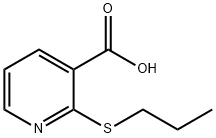2-[(2-phenylethyl)thio]nicotinic acid
- CAS NO.:496775-95-2
- Empirical Formula: C14H13NO2S
- Molecular Weight: 259.32
- MDL number: MFCD03621206
- SAFETY DATA SHEET (SDS)
- Update Date: 2024-07-02 08:55:41
![2-[(2-phenylethyl)thio]nicotinic acid Structural](https://img.chemicalbook.in/CAS/GIF/496775-95-2.gif)
What is 2-[(2-phenylethyl)thio]nicotinic acid?
The Uses of 2-[(2-phenylethyl)thio]nicotinic acid
ML-099 is a small molecule pan activator of Ras-related GTPases, activating Rac1, cell division cycle 42, Ras, and Rab-2A.
Definition
ChEBI: 2-(2-phenylethylthio)-3-pyridinecarboxylic acid is a member of pyridines and an aromatic carboxylic acid.
Properties of 2-[(2-phenylethyl)thio]nicotinic acid
| storage temp. | Store at -20°C |
| solubility | DMSO: 10 mg/ml |
| form | A crystalline solid |
| color | White to off-white |
Safety information for 2-[(2-phenylethyl)thio]nicotinic acid
Computed Descriptors for 2-[(2-phenylethyl)thio]nicotinic acid
New Products
Tert-butyl bis(2-chloroethyl)carbamate 4-Methylphenylacetic acid N-Boc-D-alaninol N-BOC-D/L-ALANINOL 3-Morpholino-1-(4-nitrophenyl)-5,6-dihydropyridin- 2(1H)-one Furan-2,5-Dicarboxylic Acid Tropic acid DIETHYL AMINOMALONATE HYDROCHLORIDE 1,1’-CARBONYLDIIMIDAZOLE R-2-BENZYLOXY PROPIONIC ACID 1,1’-CARBONYLDI (1,2-4 TRIAZOLE) N-METHYL INDAZOLE-3-CARBOXYLIC ACID (2-Hydroxyphenyl)acetonitrile 4-Bromopyrazole 5-BROMO-2CYANO PYRIDINE 5,6-Dimethoxyindanone 5-broMo-2-chloro-N-cyclopentylpyriMidin-4-aMine 2-(Cyanocyclohexyl)acetic acid 4-methoxy-3,5-dinitropyridine 2-aminopropyl benzoate hydrochloride 1-(4-(aminomethyl)benzyl)urea hydrochloride diethyl 2-(2-((tertbutoxycarbonyl)amino) ethyl)malonate tert-butyl 4- (ureidomethyl)benzylcarbamate Ethyl-2-chloro((4-methoxyphenyl)hydrazono)acetateRelated products of tetrahydrofuran
![2-[(2-phenylethyl)thio]nicotinic acid](https://img.chemicalbook.in/CAS/GIF/496775-95-2.gif)
![2-[(2-OXO-2-PHENYLETHYL)THIO]NICOTINIC ACID](https://img.chemicalbook.in/CAS/GIF/142221-23-6.gif)

![2-([2-(3-NITROPHENYL)-2-OXOETHYL]THIO)NICOTINIC ACID](https://img.chemicalbook.in/StructureFile/ChemBookStructure3/GIF/CB7207501.gif)
You may like
-
 ML099 >95% CAS 496775-95-2View Details
ML099 >95% CAS 496775-95-2View Details
496775-95-2 -
 1975-50-4 98%View Details
1975-50-4 98%View Details
1975-50-4 -
 2-HYDROXY BENZYL ALCOHOL 98%View Details
2-HYDROXY BENZYL ALCOHOL 98%View Details
90-01-7 -
 2-Chloro-1,3-Bis(Dimethylamino)Trimethinium Hexafluorophosphate 221615-75-4 98%View Details
2-Chloro-1,3-Bis(Dimethylamino)Trimethinium Hexafluorophosphate 221615-75-4 98%View Details
221615-75-4 -
 61397-56-6 CIS BROMO BENZOATE 98%View Details
61397-56-6 CIS BROMO BENZOATE 98%View Details
61397-56-6 -
 14714-50-2 (2-Hydroxyphenyl)acetonitrile 98+View Details
14714-50-2 (2-Hydroxyphenyl)acetonitrile 98+View Details
14714-50-2 -
 118753-70-1 98+View Details
118753-70-1 98+View Details
118753-70-1 -
 733039-20-8 5-broMo-2-chloro-N-cyclopentylpyriMidin-4-aMine 98+View Details
733039-20-8 5-broMo-2-chloro-N-cyclopentylpyriMidin-4-aMine 98+View Details
733039-20-8
Statement: All products displayed on this website are only used for non medical purposes such as industrial applications or scientific research, and cannot be used for clinical diagnosis or treatment of humans or animals. They are not medicinal or edible.